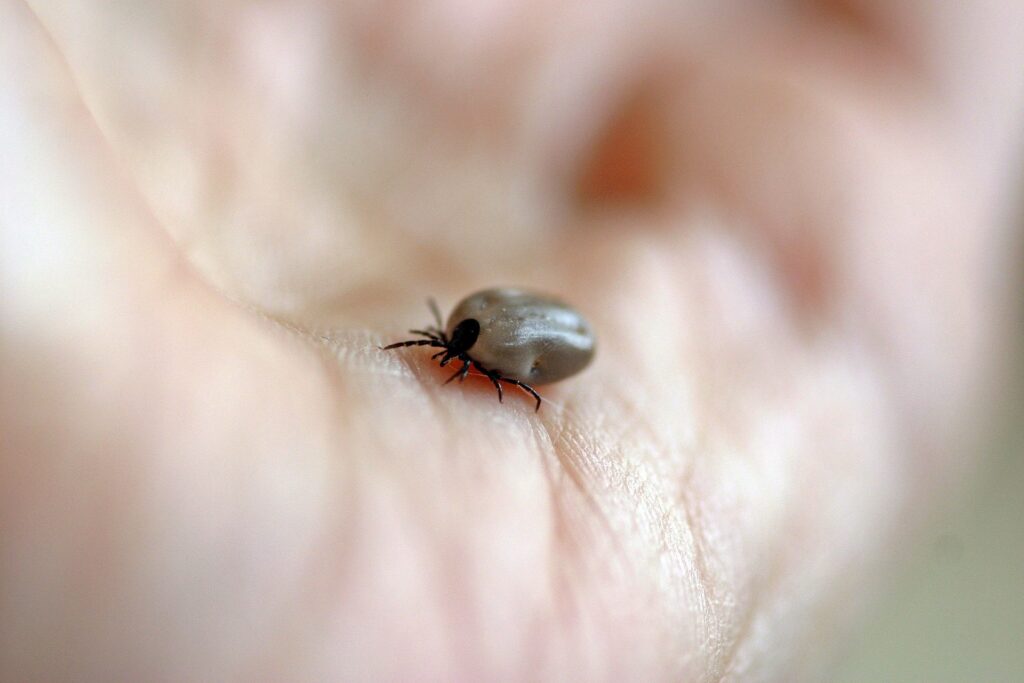Ticks carry a variety of infectious diseases that are spread via the animals they have bitten. Various animals can become infected, including humans, dogs, cats, and livestock. Some kinds of ticks may also cause irritation and allergic reactions after bites. These are just some of the many reasons pet owners need to check their animals for ticks this winter season and why you need to search for a “pest control near me” to keep these ticks away all year long. Give Lookout Pest Control, formerly Any Pest Inc., a call today!
What Are Ticks?
Ticks are small, arachnid relatives of spiders. They are parasites that feed on the blood of animals, including humans. Ticks are found in wooded areas, tall grasses, and meadows. They attach to animals and feed on their blood for several days or weeks, then drop off and search for another host.
Tick bites can be harmful to people and pets. These pests carry several diseases transmitted through bites or contact with a tick’s bodily fluids. You should be aware of ticks’ common signs and symptoms so that you can recognize them if you encounter one in your neighborhood.
Affordable Plans For
Pest Control
Get your complimentary quote by phone and be one-step closer to pest-free living. We will create a service plan that best fits your needs and a state-certified pest control professional will perform thorough service.
The main types of ticks you’re likely to find in your yard are larvae and nymphs. Adult ticks can be as small as the head of a pin or as large as a small grape. Adult female ticks can lay up to 2,000 eggs at once!
What Dangers Do Ticks Pose For Your Pets?
Ticks are vectors for several diseases that can affect both dogs and humans. Some carry viruses, bacteria, or parasites that can be transmitted to humans or animals through a bite. Ticks can also spread disease by biting uninfected animals and passing on their saliva to other animals through a blood meal.
Most tick-borne diseases have similar symptoms in dogs and humans. They include:
Lyme disease is caused by Borrelia burgdorferi bacteria and is transmitted by the deer tick (Ixodes scapularis) or black-legged tick (Ixodes pacificus). These ticks carry Borrelia burgdorferi bacteria, which causes Lyme disease in dogs and humans.
Lyme disease symptoms may include fever, lethargy, lameness, and joint pain. In severe cases, neurological problems may develop months after infection; this condition is called Lyme meningoencephalitis (LME). Dogs with LME may exhibit head tilt, circling, seizures, and cognitive dysfunction like confusion or disorientation. If your dog has any of these symptoms, see your veterinarian immediately for treatment options.
Ticks can transmit Lyme disease, anaplasmosis, ehrlichiosis, babesiosis and Rocky Mountain spotted fever. They are also linked to tick paralysis and tick allergy syndrome (TAS).
Should You Be Concerned About Ticks This Winter?
Winter is the time of year when ticks are most active. They’re looking for hosts to bite so they can feed on blood and survive through the cold months ahead.
This makes ticks more likely to attach themselves to humans, too. If you’re out in the woods or walking in tall grasses, there’s a chance that you’ll come into contact with an infected tick and develop the diseases they carry — including Lyme disease and Rocky Mountain spotted fever.
Even if you don’t live where ticks are common, it’s still possible for them to sneak into your home via animal carriers or even on clothes that have been worn outside during tick season. You should take preventive measures against these pests just in case one manages to hitchhike its way into your yard or home.
How Do You Protect Your Pets From Ticks This Winter?
The weather is changing, and the risk of tick-borne diseases comes with it. While there are many ways to protect yourself and your family from ticks, it can be a lot harder to keep your pets safe.
If you’re a pet owner, you know how hard it can be to keep them safe from all pests. Pets are more likely to be exposed because they spend more time outdoors than their human counterparts. They also roam through areas where ticks are more likely to live and feed on their blood, like tall grassy areas and wooded regions.
Pre-Treatment of Your Pet
Tick preventatives help protect dogs and cats against ticks for up to three months by killing them before they can attach. Talk to your veterinarian about which product is suitable for your pet’s needs and whether or not it’s safe for use in combination with other medications.
Vaccinate your dog or cat against Lyme disease. Vaccination is an important preventive measure against Lyme disease because it helps stimulate an immune response that can kill off any bacteria in the bloodstream before symptoms manifest themselves as Lyme disease. While vaccines aren’t 100% effective, they do offer some protection against this deadly illness.
Check Regularly & Remove Them Immediately
Check your pet for ticks every day! Ticks are on the move in the fall and winter months when temperatures drop below 55 degrees Fahrenheit (12.7 degrees Celsius). They’re most active during rain or snow storms when temperatures exceed 45 degrees F (7 C). They may be crawling on grassy areas where your pet spends time outside or hiding in tall grasses or shrubbery. If you find a tick on your pet’s skin, remove it straight away with tweezers as close to its mouth as possible without crushing its body, so it doesn’t leave behind any bacteria after removal.
Annual Screening for Tick-Borne Diseases
One way to protect your pet from these diseases is by having a veterinarian perform annual screenings for tick-borne diseases.

Need Tick Control? Call Lookout Pest Control Today!
If you’re concerned about ticks on your pets or around your home, contact Lookout Pest Control today to schedule an assessment of your property by one of our certified technicians. Since they only stay around if there is a host, it is important to take preventative measures to minimize ticks in your area. Keeping your grass cut short can aid in decreasing the likelihood of an infestation. For reliable and affordable tick prevention, give us a call today!
Check Your Animals For Ticks This Winter Season in Kennesaw, GA and beyond!
Proudly serving Cobb County and the Atlanta Metro Area. Any bug, Lookout Pest Control.

